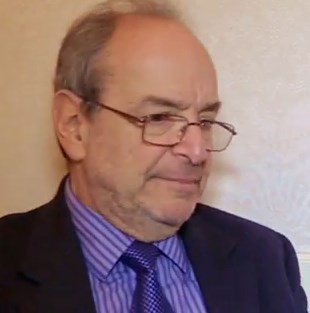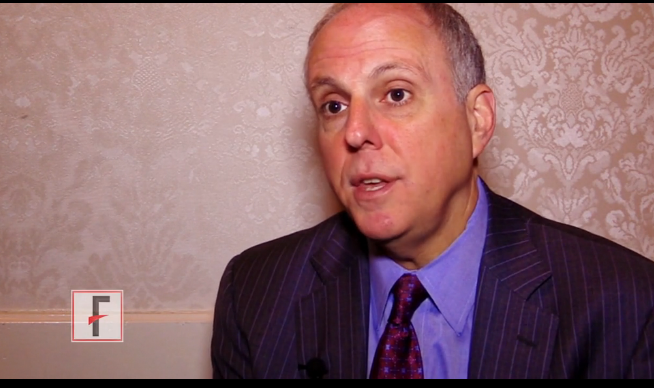User login
American Academy of Clinical Psychiatrists (AACP): Psychiatry Update 2015
VIDEO: Consider adult ADHD in dementia differential diagnosis
CHICAGO – Forgetfulness is one of the most common symptoms of adult attention- deficit/hyperactivity disorder and should “definitely” be considered in the differential diagnosis for dementia in older patients who present with this complaint.
That’s the counsel of Dr. Anthony L. Rostain, professor of psychiatry at the Hospital of the University of Pennsylvania and the Children’s Hospital of Philadelphia, who spoke at Psychiatry Update 2015, sponsored by Current Psychiatry and the American Academy of Clinical Psychiatrists.
“An adult with ADHD may have enough resilience that they’ve been functioning well over the decades, but now it affects their ability to hold a job or maintain a relationship,” Dr. Rostain said. “Primary care doctors are typically the first health professional in a position to help these patients identify and manage their condition.”
Learn more about diagnosing and crafting appropriate treatment regimens for adults with ADHD, including helping them to see it as a chronic disorder, not a stigma or disease.
Current Psychiatry and this news organization are owned by the same parent company.
On Twitter @whitneymcknight
CHICAGO – Forgetfulness is one of the most common symptoms of adult attention- deficit/hyperactivity disorder and should “definitely” be considered in the differential diagnosis for dementia in older patients who present with this complaint.
That’s the counsel of Dr. Anthony L. Rostain, professor of psychiatry at the Hospital of the University of Pennsylvania and the Children’s Hospital of Philadelphia, who spoke at Psychiatry Update 2015, sponsored by Current Psychiatry and the American Academy of Clinical Psychiatrists.
“An adult with ADHD may have enough resilience that they’ve been functioning well over the decades, but now it affects their ability to hold a job or maintain a relationship,” Dr. Rostain said. “Primary care doctors are typically the first health professional in a position to help these patients identify and manage their condition.”
Learn more about diagnosing and crafting appropriate treatment regimens for adults with ADHD, including helping them to see it as a chronic disorder, not a stigma or disease.
Current Psychiatry and this news organization are owned by the same parent company.
On Twitter @whitneymcknight
CHICAGO – Forgetfulness is one of the most common symptoms of adult attention- deficit/hyperactivity disorder and should “definitely” be considered in the differential diagnosis for dementia in older patients who present with this complaint.
That’s the counsel of Dr. Anthony L. Rostain, professor of psychiatry at the Hospital of the University of Pennsylvania and the Children’s Hospital of Philadelphia, who spoke at Psychiatry Update 2015, sponsored by Current Psychiatry and the American Academy of Clinical Psychiatrists.
“An adult with ADHD may have enough resilience that they’ve been functioning well over the decades, but now it affects their ability to hold a job or maintain a relationship,” Dr. Rostain said. “Primary care doctors are typically the first health professional in a position to help these patients identify and manage their condition.”
Learn more about diagnosing and crafting appropriate treatment regimens for adults with ADHD, including helping them to see it as a chronic disorder, not a stigma or disease.
Current Psychiatry and this news organization are owned by the same parent company.
On Twitter @whitneymcknight
EXPERT ANALYSIS FROM PSYCHIATRY UPDATE 2015
VIDEO: Smoking cessation efforts often enhanced by depression treatment
CHICAGO– Helping patients quit smoking, whether those with severe mental illness or comorbid depression, is an “excellent opportunity” for primary care doctors and psychiatrists to work together.
That’s according to Dr. Robert M. Anthenelli, a professor of psychiatry at the University of California, San Diego, and director of the Pacific Treatment and Research Center there.
Depression and smoking are often comorbid in patients, and nearly half of all tobacco products consumed in the United States are done so by people with some form of a psychiatric or other substance use disorder. In this interview, recorded at the meeting, sponsored by Current Psychiatry and American Academy of Clinical Psychiatrists, Dr. Anthenelli discusses brain changes in tobacco use, why there is a link between smoking and mental illness, and what primary care physicians can do to help their patients who smoke. He also addresses whether complete cessation is essential to one’s well-being.
Dr. Anthenelli is a consultant to Pfizer and Arena Pharmaceuticals.
Current Psychiatry and this news organization are owned by the same parent company.
The video associated with this article is no longer available on this site. Please view all of our videos on the MDedge YouTube channel
On Twitter @whitneymcknight
CHICAGO– Helping patients quit smoking, whether those with severe mental illness or comorbid depression, is an “excellent opportunity” for primary care doctors and psychiatrists to work together.
That’s according to Dr. Robert M. Anthenelli, a professor of psychiatry at the University of California, San Diego, and director of the Pacific Treatment and Research Center there.
Depression and smoking are often comorbid in patients, and nearly half of all tobacco products consumed in the United States are done so by people with some form of a psychiatric or other substance use disorder. In this interview, recorded at the meeting, sponsored by Current Psychiatry and American Academy of Clinical Psychiatrists, Dr. Anthenelli discusses brain changes in tobacco use, why there is a link between smoking and mental illness, and what primary care physicians can do to help their patients who smoke. He also addresses whether complete cessation is essential to one’s well-being.
Dr. Anthenelli is a consultant to Pfizer and Arena Pharmaceuticals.
Current Psychiatry and this news organization are owned by the same parent company.
The video associated with this article is no longer available on this site. Please view all of our videos on the MDedge YouTube channel
On Twitter @whitneymcknight
CHICAGO– Helping patients quit smoking, whether those with severe mental illness or comorbid depression, is an “excellent opportunity” for primary care doctors and psychiatrists to work together.
That’s according to Dr. Robert M. Anthenelli, a professor of psychiatry at the University of California, San Diego, and director of the Pacific Treatment and Research Center there.
Depression and smoking are often comorbid in patients, and nearly half of all tobacco products consumed in the United States are done so by people with some form of a psychiatric or other substance use disorder. In this interview, recorded at the meeting, sponsored by Current Psychiatry and American Academy of Clinical Psychiatrists, Dr. Anthenelli discusses brain changes in tobacco use, why there is a link between smoking and mental illness, and what primary care physicians can do to help their patients who smoke. He also addresses whether complete cessation is essential to one’s well-being.
Dr. Anthenelli is a consultant to Pfizer and Arena Pharmaceuticals.
Current Psychiatry and this news organization are owned by the same parent company.
The video associated with this article is no longer available on this site. Please view all of our videos on the MDedge YouTube channel
On Twitter @whitneymcknight
EXPERT ANALYSIS FROM PSYCHIATRY UPDATE 2015
VIDEO: New directions in treating adult ADHD
CHICAGO – What are the most important side effects to be aware of when medically treating adult attention-deficit/hyperactivity disorder? What are the most common comorbidities and how should they be treated? And what is the latest in nonpharmaceutical, as well as emerging medical treatment for what Dr. Anthony L. Rostain, a professor of psychiatry at the University of Pennsylvania, Philadelphia, says is not a disease but a disorder?
In this video interview, recorded at Psychiatry Update 2015, sponsored by Current Psychiatry and the American Academy of Clinical Psychiatrists, Dr. Rostain shares what excites him most about emerging treatments for adult ADHD and what clinicians should be most concerned about when prescribing. He also discusses how ADHD overlaps with Tourette syndrome.
Current Psychiatry and this news organization are owned by the same parent company.
The video associated with this article is no longer available on this site. Please view all of our videos on the MDedge YouTube channel
On Twitter @whitneymcknight
CHICAGO – What are the most important side effects to be aware of when medically treating adult attention-deficit/hyperactivity disorder? What are the most common comorbidities and how should they be treated? And what is the latest in nonpharmaceutical, as well as emerging medical treatment for what Dr. Anthony L. Rostain, a professor of psychiatry at the University of Pennsylvania, Philadelphia, says is not a disease but a disorder?
In this video interview, recorded at Psychiatry Update 2015, sponsored by Current Psychiatry and the American Academy of Clinical Psychiatrists, Dr. Rostain shares what excites him most about emerging treatments for adult ADHD and what clinicians should be most concerned about when prescribing. He also discusses how ADHD overlaps with Tourette syndrome.
Current Psychiatry and this news organization are owned by the same parent company.
The video associated with this article is no longer available on this site. Please view all of our videos on the MDedge YouTube channel
On Twitter @whitneymcknight
CHICAGO – What are the most important side effects to be aware of when medically treating adult attention-deficit/hyperactivity disorder? What are the most common comorbidities and how should they be treated? And what is the latest in nonpharmaceutical, as well as emerging medical treatment for what Dr. Anthony L. Rostain, a professor of psychiatry at the University of Pennsylvania, Philadelphia, says is not a disease but a disorder?
In this video interview, recorded at Psychiatry Update 2015, sponsored by Current Psychiatry and the American Academy of Clinical Psychiatrists, Dr. Rostain shares what excites him most about emerging treatments for adult ADHD and what clinicians should be most concerned about when prescribing. He also discusses how ADHD overlaps with Tourette syndrome.
Current Psychiatry and this news organization are owned by the same parent company.
The video associated with this article is no longer available on this site. Please view all of our videos on the MDedge YouTube channel
On Twitter @whitneymcknight
AT PSYCHIATRY UPDATE 2015


